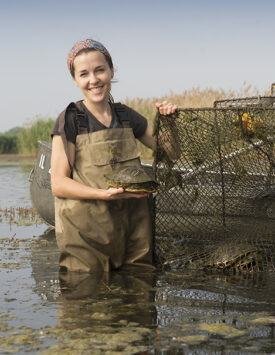Amanda majored in wildlife sciences with a minor in biology in the College of Natural Resources. She joined the Hopkins lab in the spring of 2009 working on a project examining the effects of dietary mercury on wood frogs. The following summer, as a FLeDGE participant, she assisted the wood duck project studying the effects of incubation temperature on stress hormones and locomotion. She began preparing for her senior thesis in the fall of 2009, examining the trade offs between wound healing and thermoregulation mediated by incubation temperature in wood duck (Aix sponsa) ducklings.
After graduating with her B.S. in the spring of 2011, Amanda began working as a post-baccalaureate research fellow in the Hopkins lab. Her focus was wildlife physiology, particularly the endocrine system, maternal effects and temperature-dependent sex determination.
In 2012, Amanda accepted a PhD position with Dr. Rachel Bowden at Illinois State University. Her dissertation research seeks to understand how natural seasonal variation in estrogen levels can affect turtle hatchling sex determination (TSD). Understanding how estrogens interact with temperature to affect sex determination will enhance our understanding of TSD, and increase our ability to predict how reptiles may respond to climate change. Amanda defended her dissertation work in May 2017.
Following her PhD completion, Amanda was a NSF Postdoctoral Research Fellow at the University of Tennessee. In Fall 2022, she began her role as an Associate Professor of Eco-Physiology at Northern Arizona University.

